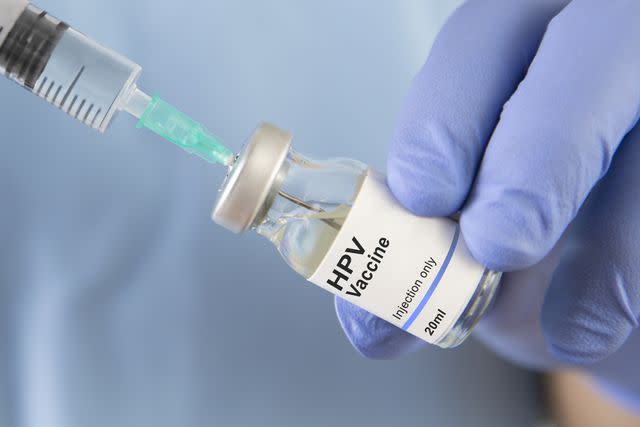What the HPV Vaccine Does If You’re Already Infected
Medically reviewed by Michael Menna, DO
The human papillomavirus (HPV) is so common that the Centers for Disease Control and Prevention (CDC) estimates that almost all sexually active people in the United States will have it at least once. If you have been diagnosed with HPV, you may wonder if you still should get vaccinated. The short answer is yes. Since there are multiple strains of HPV, vaccination is still a good idea.
Learn more about HPV vaccine guidelines, effectiveness, and next steps after an HPV diagnosis.

anilakkus / Getty Images
HPV Strain Protection From Vaccination
There are about 40 strains of HPV that can affect the genitals, but most strains do not cause symptoms and go away on their own. Sometimes, HPV leads to genital warts.
HPV is responsible for 99.7% of cervical cancer cases and contributes to other, less common types of cancer, including those affecting the following:
Anus
Penis
Vagina
Vulva
Oropharynx (throat)
The vaccine targets nine high-risk HPV strains that are the most common cause of cervical and other cancers and most of the strains that cause genital warts.
HPV Vaccination Effectiveness (When You Already Have HPV)
Getting the HPV vaccine with a current HPV diagnosis will not treat or cure the infection, but it can protect you from strains of HPV you have not been exposed to yet.
Most people with HPV do not test positive for all strains. While the HPV vaccine is most effective if you are vaccinated before you become sexually active, the vaccine provides some protection, even if you are infected with one or more HPV types included in the vaccines.
Continued Monitoring and Screening
People with a vulva should see a healthcare provider for an HPV test, pap test, or an HPV/Pap combination test beginning at age 25 and every five years after that through age 65. There is no screening test for HPV in people with male reproductive organs.
Related: How Human Papillomavirus (HPV) Is Treated
Which HPV Vaccine to Get With Diagnosed HPV
Three HPV vaccines have been licensed by the Food and Drug Administration (FDA).
9-valent HPV vaccine (Gardasil 9, 9vHPV): The nonavalent vaccine (Gardasil 9) protects against nine HPV types (types 6, 11, 16, 18, 31, 33, 45, 52, and 58) and is the only HPV vaccine currently distributed in the United States.
Quadrivalent HPV vaccine (Gardasil, 4vHPV): It prevents anogenital warts, which are caused by HPV types 6 and 11.
Bivalent HPV vaccine (Cervarix, 2vHPV): Specifically targets HPV type 16 and 18.
They are all highly effective at preventing virus types 16 and 18, responsible for 70% of cervical cancer cases worldwide, and precancerous cervical lesions caused by these virus types.
Should My Partner Get Vaccinated for HPV If I Have It?
Getting vaccinated for HPV will not treat or cure HPV. However, getting an HPV vaccination does help prevent HPV from spreading and reduces the chance of adverse outcomes if you're exposed to a different strain of the virus in the future.
The CDC recommends the following populations receive an HPV vaccine:
Eleven to twelve-year-olds receive two doses of HPV vaccine 6 to 12 months apart.
Teens and adults 15–26 should get three doses of the HPV vaccine.
People ages 9–26 with weakened immune systems should receive three doses.
The vaccination is not recommended for people older than 26. If you are older than 26, speak with a healthcare provider about the risk of new HPV infections and the possible benefits of receiving an HPV vaccine.
The HPV vaccine provides less benefit since more people in this age range have already been exposed to HPV. Additionally, the HPV vaccine is not recommended for people with severe allergies, who have had a life-threatening allergic reaction to any vaccine ingredient, have yeast allergies, or are pregnant.
Where to Get Vaccinated
You can get an HPV vaccine at a healthcare provider's office, community health clinics such as Planned Parenthood, school-based health centers, and some pharmacies. Talk to a healthcare provider to determine if an HPV vaccine is right for you.
Related: My Partner Has Genital Warts. Will I Get Them?
Sex and Intimacy Safety With HPV
HPV is spread through skin-to-skin contact during genital or oral sex, though it is most commonly passed during vaginal or anal sex. It can pass from one person to the next without signs or symptoms. Symptoms can also develop years after having sex with a person infected with HPV. However, using condoms and dental dams correctly every time you have sex can lower the chances of getting HPV or reduce your partner's risk of infection.
Related: Do You Have to Be a Virgin to Get the HPV Vaccine?
Summary
The HPV vaccine is highly effective at preventing the strains of HPV responsible for most cervical cancers worldwide. While it is most effective for young people before they become sexually active, some adults may still choose to receive the HPV vaccine to protect them from strains that they have not yet been exposed to. If you've already been exposed to HPV, correctly using condoms and dental dams each time you have sex can help lower the risk of spreading the infection to your partner.
Read the original article on Verywell Health.

